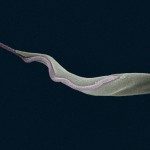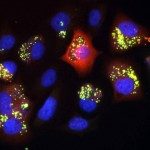Link to Pubmed [PMID] – 16164548
Mol. Microbiol. 2005 Oct;58(1):46-60
Polyclonal lymphocyte activation is one of the major immunological disturbances observed after microbial infections and among the primary strategies used by the parasite Trypanosoma cruzi to avoid specific immune responses and ensure survival. T. cruzi is the insect-transmitted protozoan responsible for Chagas’ disease, the third public health problem in Latin America. During infection of its mammalian host, the parasite secretes a proline racemase that contributes to parasite immune evasion by acting as a B-cell mitogen. This enzyme is the first described eukaryotic amino acid racemase and is encoded by two paralogous genes per parasite haploid genome, TcPRACA and TcPRACB that give rise, respectively, to secreted and intracellular protein isoforms. While TcPRACB encodes an intracellular enzyme, analysis of TcPRACA paralogue revealed putative signals allowing the generation of an additional, non-secreted isoform of proline racemase by an alternative trans-splicing mechanism. Here, we demonstrate that overexpression of TcPRAC leads to an increase in parasite differentiation into infective forms and in its subsequent penetration into host cells. Furthermore, a critical impairment of parasite viability was observed in functional knock-down parasites. These results strongly emphasize that TcPRAC is a potential target for drug design as well as for immunomodulation of parasite-induced B-cell polyclonal activation.





